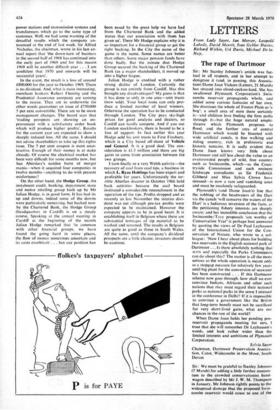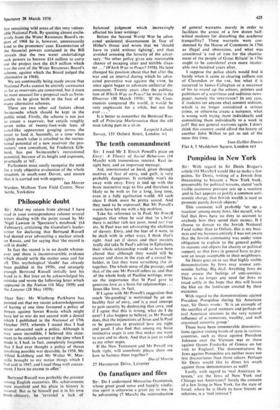From Lady Sayer, Ian Mercer, Leopold Labedz, David Morris, Stan
Gebler Davies, Richard Witkin, Uri Davis, Michael De-la- Noy.
LETTERS
The rape of Dartmoor
Sir: Mr Stanley Johnson's article was fac- tual in all respects, and in her attempt to denigrate it (and, in passing, this Associa- tion) Dame Joan Vickers (Letters, 21 March) has strayed into cloud-cuckoo-land. She has swallowed Plymouth Corporation's Swin- combe reservoir propaganda whole, and added some curious fantasies of her own. She dismisses the whole of Foxtor Plain as 'a bog'; a small area of mire there certainly is—and children love finding the firm paths through it—but the huge natural amphi- theatre which Plymouth proposes to flood, and the further area of central Dartmoor which would be bisected with wide artificial canals, is fine walking and riding country, rich in prehistoric and historic remains. It is sadly evident that Dame Joan knows very little about Dartmoor and still less about the value to an overcrowded people of wild, free country such as Swincombe, which—as the Coun- tryside Commission and such eminent landscape consultants as Sir Frederick Gibberd and Miss Sylvia Crowe have stressed—is now a rare and vanishing asset and must be resolutely safeguarded.
Plymouth's (and Dame Joan's) line that the robbing of the headwaiters of the Dart via the canals 'will conserve the waters of the Dart' is a ludicrous inversion of the facts, as the petitioning fishery interests are sharply aware; and her incredible conclusion that the Swincombe/Tavy proposals 'are worthy of Conservation Year' is perhaps best answered by quoting the views of Dr Paul Leyhausen of the International Union for the Con- servation of Nature, who wrote to a col- league: 'Now I hear about plans for building two reservoirs in the English national park of Dartmoor ... Is there absolutely nothing that IUCN and especially the Parks Commission can do about this? The matter is all the more serious as the whole operation is meant only as a stopgap measure for relatively few years until big plant for the conversion of seawater has been constructed . . . If this Dartmoor scheme now goes through, how shall we ever convince Indians, Africans and other such nations that they must regard their national parks as national parks in the sense I stressed at the conference in Delhi? If it is impossible to convince a government like the British that long-term benefit must not be sacrificed for very short-lived gains, what are our chances in the rest of the world?
When Dame Joan holds her pending pro- reservoir propaganda meeting for MPS. I trust that she will remember Dr Leyhausen's words. and look rather wider than the limited interests and ambitions of Plymouth Corporation.
Sir: We must be grateful to Stanley Johnson (7 March) for adding a little further momen- tum to the crowded conservationist band- wagon described by Mr J. W. M. Thompson in January. Mr Johnson rightly points to the widespread damage that the proposed Swin- combe reservoir would cause to one of the
Sylvia Sayer Chairman, Dartmoor Preservation Associa- tion, Cator, Widecombe in the Moor, South Devon few remaining wild areas of this very vulner- able National Park. By quoting almost exclu- sively from the Water Resources Board's re- Port of 1968 he is, however, unnecessarily kind to the promoters' case. Examination of the financial powers contained in the Bill reveals .that the two water undertakings seek powers to borrow £14 million to carry out the project (not the £6.9 million which was the cost of the Water Resources Board's scheme, against which the Board judged the alternative in 1968).
We are continually being made aware that National Parks cannot be entirely sacrosanct as far as reservoirs are concerned, but it must be most unusual for a proposal such as Swin- combe to be given birth in the face of so many alternative schemes.
There are two other sad factors about Swincombe which should be kept in the public mind. Firstly, the scheme is not just to create a reservoir, but entails roughly seven miles of twenty-foot-wide feats of canal-like appearance gouging across the moor to feed it. Secondly, at a time when rightly much value is attached to the recrea- tional potential of a new reservoir the pro- moters' own consultant, Sir Frederick Gib- herd, has put Swincombe's recreational potential, because of its height and exposure, practically at `nil'.
Parliament must surely recognise the need for a truly objective evaluation of the whole situation in southwest Devon, and ensure that it is carried out with urgency.
Ian Mercer Warden, Malham Tarn Field Centre, Near Settle, Yorkshire



































 Previous page
Previous page